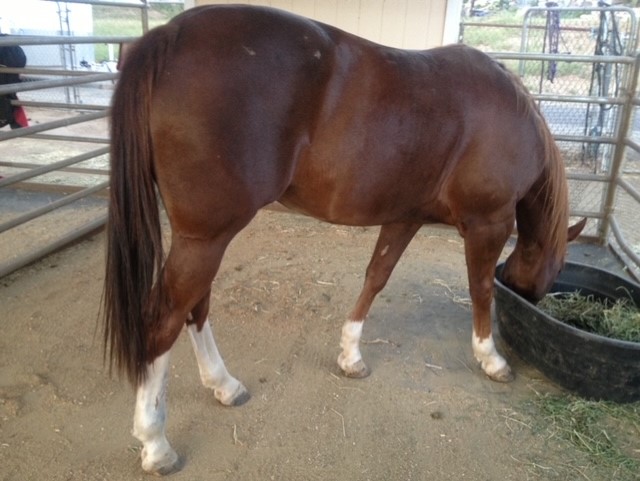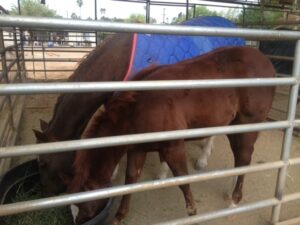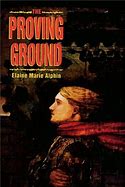
Eat Like A Horse
Have you heard the saying “eat like a horse”?
It often means eating a large volume of food, devouring food or eating fast, helping yourself to someone else’s food, and other (sometimes) unflattering examples, like “making a pig of yourself”. That’s another crazy idiom meaning, among other things, eat too noisily or eat more that your share.
“Eat like a horse” is a contradiction, because for one thing, horses don’t eat fast. Nature built them to walk and graze all day long, snatching mouthfuls of feed here and there. This results in frequent and small meals, keeping their digestive systems moving and healthy.
Now, about eating noisily—when I feed my horses their supplements and some small form of pelleted food, they can eat like pigs!
 My dun horse slobbers and loudly chomps (despite receiving regular dental care—the slobbering is just plain poor manners). My 8-year old gelding tries to grab the feed bucket before I can get it into his stall, often spilling the contents onto the flooring. Can you imagine grabbing your plate from the server at a restaurant, spilling everything on the table? My retired reiner closes his eyes and savors every bite, like it’s a scrumptious dessert. But don’t get too close to his feed bucket or he will pin his ears at you, clearly saying “Don’t even think about it!”
My dun horse slobbers and loudly chomps (despite receiving regular dental care—the slobbering is just plain poor manners). My 8-year old gelding tries to grab the feed bucket before I can get it into his stall, often spilling the contents onto the flooring. Can you imagine grabbing your plate from the server at a restaurant, spilling everything on the table? My retired reiner closes his eyes and savors every bite, like it’s a scrumptious dessert. But don’t get too close to his feed bucket or he will pin his ears at you, clearly saying “Don’t even think about it!”
Truly an example of the three little pigs.
Each of them receive a portion of hay specific to their weight requirements. Still, they shove their hay around with their muzzles, trying to get to what they think are sweeter or more tender bits, and some good amount of their hay goes flying into their neighbor’s stall, under the pipe rails. So of course, the other horse, let’s say it’s Topper, thinks, “Oh hey! How nice of you. I’ll stop eating my own hay and go eat yours.” Or, if Topper’s hay lands just inside his stall, his neighbor will try all kinds of contortions to reach Topper’s hay. This includes practically getting down on their knees, sticking their heads under the lowest rail, and stretching their lips and tongues out to snatch any morsel they can—even when there’s plenty of hay in their own stall.
So I guess I could say, my horses do eat like pigs. Shocking!
On a more serious note, horses’ digestive systems are very sensitive. Horses can “colic”, which is a term for any type of digestive blockage, indigestion, gas, abdominal pain, etc. Colic can be deadly. Horses can also develop stomach ulcers.
Sudden changes in feed should be avoided, along with foods such as rhubarb, dairy products, potatoes, avocado, lawn clippings (because clippings ferment too quickly), tomatoes and other vegetables, as examples. However, apples and carrots are always welcome, in moderation.
So, is the idiom “eat like a horse” really correct? Or, do horses “eat like a pig”?
What’s really important here is to understand how and what horses should not eat, and always provide them with good feed appropriate to their nutritional needs, exercise, fresh water, dental care and more.
Check out the internet for more information.




